Allow me to preface: The lines of text below are a collection of loosely connected thoughts on work, idols, and what we hold dear. There isn’t a established narrative; it’s more like a spontaneous stream of thoughts that popped up during a caffeine-fueled bout of introspection. I find this style to be the most genuine showcase of my thought processes and verbal speech. Thank you for taking interest.
adolescence;nonsense
Through the many stages of my life, there have been little aspects that stay consistent: the schools I went to, the friends I’ve had, the churches I’ve attended—hell, even the food I ate was subject to change depending on the weird diet my mother decided she wanted to try. Despite all of these changes, the one thing that’s never seemed to change is my love for all things Japanese. From a young age, my father bought many Japanese fighting games: Blazblue, Guilty Gear, King of Fighters, Dead or Alive, you name it. My uncles often came to my childhood home to run games of Tekken and Marvel vs. Capcom on our first-generation PS3 with my dad. I remember everyone crowding around us in front of our old 42-inch Philips flat-screen TV, cheering when my father pulled off a Raven combo they hadn’t seen or laughing when I would choose triple Cable with all-a-type assists. A rather fond memory I have is of building my first model kit, a 1/144 scale Gundam Deathscythe. It was a gift from my still-in-high school uncle. He knew that I had a lot of free time to kill during my annual summer stay at my grandmother’s place and wanted me to try something he loved. I was terrible at it and lost quite a few parts in the seemingly infinite void that was the brown carpet in the living room. Even then, it helped me craft the identity I hold dear to my heart. That identity hadn’t fully blossomed yet, up until the year 2011 (I know, I’m a fetus), when my family and I sat down and watched Rurouni Kenshin.
You know that saying, “People will forget what you said, people will forget what you did, but people will never forget how you made them feel.” ? 7-year-old Elijah wasn’t old enough to absorb the messages and story in the series, and quite frankly, I don’t remember what happened in the anime, but whatever it was, it sure was cool. There was a Samurai who didn’t like killing but was haunted by his past and that’s all I needed to know. Children watch PG-13 action films and decide they want to be like the hero. I was no different, but instead of admiring the hero, I found myself far more interested in the “heroes” around me. My father and his brothers slammed on their controllers, articulating the joysticks in ways that I, even now, still can’t do. My high school-aged uncle worked part-time only to spend every last cent buying whatever model kit he could get his hands on. I loved the passion behind their starry eyes, there wasn’t a shred of shame or doubt. For it was love, in the form that even a 7-year-old boy would understand.
fake your style
Unknowingly, I seemed to have developed a surprisingly practical approach to life, at least in regards to my career. How else could I afford to craft the ultimate symbol of love, passion, and hedonistic capitalism—the otaku room? With that goal in mind, I decided to set my sights on becoming a true warrior of devotion—an accountant. It’s no surprise to anyone; really, it’s a reliable job and degree, and you can ideally find work anywhere. Every business needs people who are good with numbers and money. It’s a valuable set of skills for both work and personal use. Although that reasoning alone wasn’t enough, I could point towards my Asian upbringing; we always had a focus on good grades and being set for the future. I come from a line of various business majors who, in more recent years, have held decent positions. But who am I kidding? I made this choice because of the tremendous influence that Japanese media has on me. Pointing to a specific series or interaction I’ve had that has affected this decision is impossible because it’s everywhere. Any generic rom-com anime you’ve seen probably has an older parental figure that works in an office. The picturesque working man of Japan is never a construction worker or a mangaka; it’s a deathly drunk Salaryman falling asleep alone on a subway train. The latter is obviously a distinctly negative thing, especially when you consider the suicide rates and infamous black companies of Japan, but as an American, I don’t have that problem. I could focus on the comfortable and positive aspects of the working culture. I can be useful to my colleagues, my boss, and my eventual family. Who knows? I might have kids one day, too. Thus, I entered a college in my hometown with the intention of majoring in accounting.
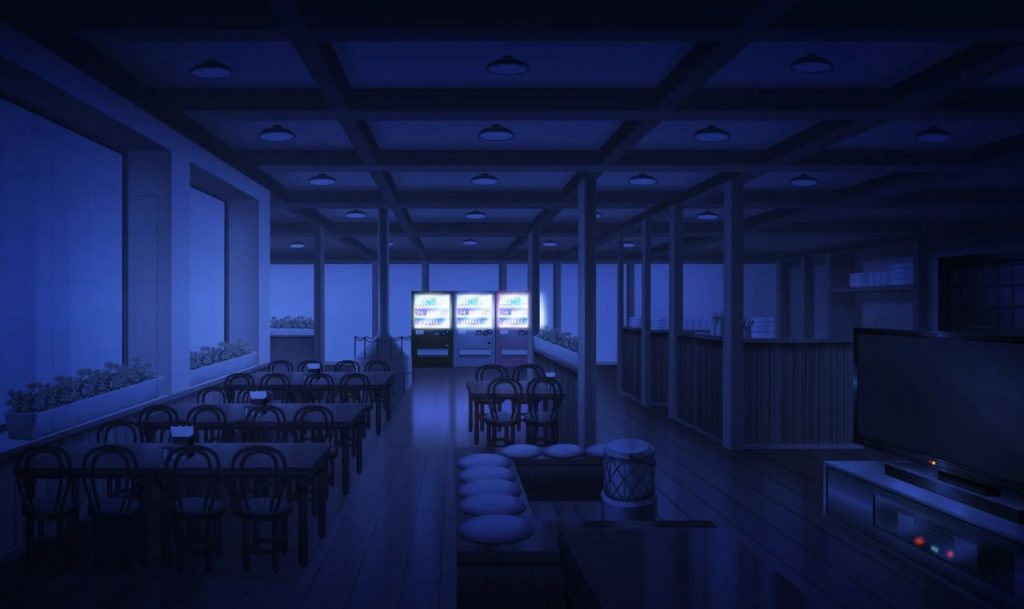
I saw accounting as something I needed to do to ensure I had a stable future. I romanticized the idea of being a cog in the machine—just another sheep, a nameless animal. I would have a stable life and a good future with the career I was deadset on. It was an objectively a great choice, but I felt like I was repressing myself in a way.
I regularly visited the business building at night, lounging around on the balcony, listening to some introspective jazz or other tonally similar music, and wondering why I decided to go down this path. Why do I have to work? I stared into the late-night environment. I’ve found solitude and the mundane to be comforting. The empty campus, once filled with people, was now completely empty. I loved the feeling of being alone; there was nothing greater than accepting your own insignificance to the tunes of Kessoku Band’s KaraKara. (do yourself a favor and get a pair of HiFi audio IEMs) I felt the cold breeze and heard a distant buzz from a bright, florescent light above the stairwell.
“Stop thinking about your own self worth.”
The sounds of my footsteps envelope the empty hallway beside me.
“Everyday is just today, stretching to eternity.”
Still thinking the same things I usually do after a late-night class, I left the building. “A monotonous cycle with no room to breathe.”
I rode the usual deserted bus back to the nearest stop close to where I live now. I could only ever peek over my Samsung Galaxy ZFlip4 when there was nobody around me. Perhaps one way to protect my own self-importance was to ignore my surroundings, only lifting my gaze when there was no one to challenge my humanity. Of course, this was insulting to the bus driver. He was probably more human than I ever could be.
“Just gotta get used to it.”
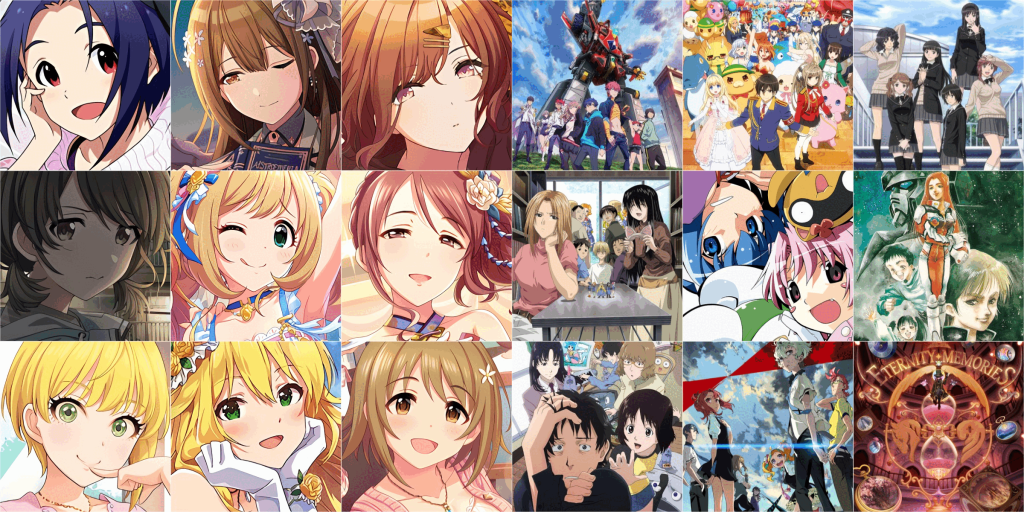
take my soul
My introduction to the series began with the first IDOLM@STER anime during middle school, but I didn’t identify myself as a fan of the series until I bought an account for Cinderella Girls Starlight Stage. There was an absurd amount of characters, with the total reaching over 200. In typical moe fashion, these girls have their own niches that cater to specific types of otaku. Finding “the one” that you love is as important to an otaku as having a MyAnimeList account and a 3×3. Preferences are puzzling, the concept alone blurs itself into an identity rather than a fixed choice. With such a statement, I become a person who thinks that’s their favorite thing. Although, let it be known that I do harbor genuine affection, sometimes.
With that said, do you look for one that is centered around one of your main interests or whoever looks the cutest? There’s a few other characters that appealed to me, but I was pretty limited to whatever had the most translated material. Being the self-proclaimed “boring practicalist” I am, I was drawn to a character that mirrored some of the ideas that I carried with me, Miyu Mifune. (middle right girl on the 3×3) Her introduction to the Starlight Stage (not Deremas, because I didn’t play that one) had her and the producer meeting on Christmas Eve. The producer, being the gentleman he is, sees her crouching down due to one of her broken heels and offers her a helping hand. She laments about how she’s unnoticed by the other adults, always going with the flow and doing uninspiring work. The producer takes this opportunity to ask if she would like a new occupation—if she wants to become an idol.
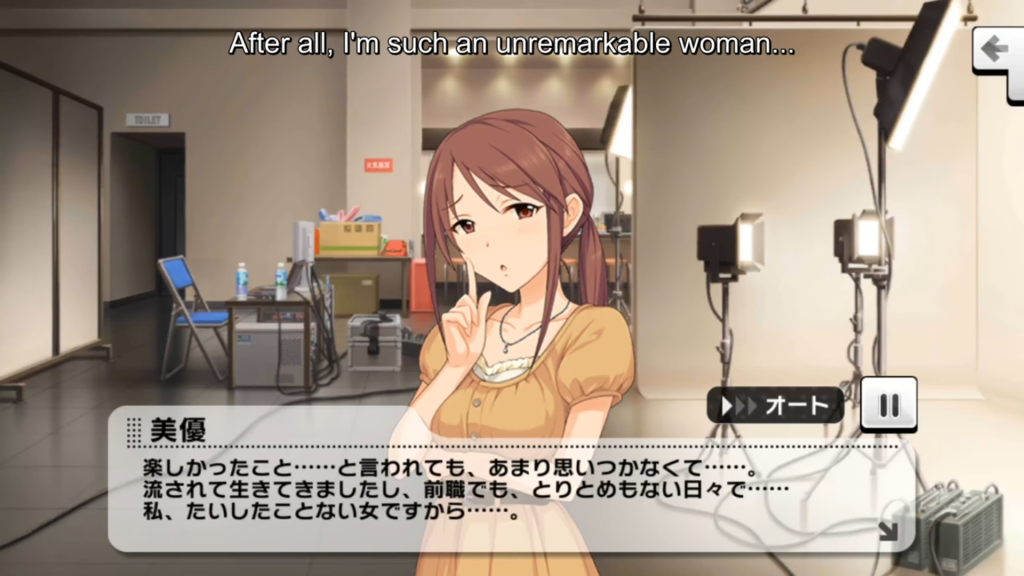
She’s a 26-year-old woman, which is already quite an accomplishment in IM@S given that the majority of the cast is in the 14–17 age range. She’s cute, she’s gentle, and she also has a crush on the main character, and as unfortunate as it is, I am fatally attracted to these “for you” relationships. In her main story, she contemplates the sudden change in occupation and the even more sudden departure from her parent’s home. Her mother finds out Miyu became an idol (she’s literally on television) and wants to meet with her. She consults some of the older members of the cast and our gentleman Producer tries his best to console her. Still, Miyu worries that her mother would want her to quit being an idol, and you likely know where this is going because it’s an IDOL franchise. Her mother was fine with a 26-year-old woman making her own decisions and only felt upset that she couldn’t see her daughter’s debut.
The story is a bit cliche but there was really no other way it could have ended. It was a simple conclusion that I saw coming from a mile away. But why did it feel like something more profound? The looming threat holding you back from your own dreams is most often yourself, or at least, it’s something your mind came up with. That’s the only take away from this event. It served its purpose and piqued my interest in the characters; they began to become much more than “cute girls” with one or two moe points to distinguish themselves. I started to understand myself through them.
IDOLMASTER Shiny Colors is the latest entry in the long-standing idol-raising franchise by Bandai Namco. As a new producer for 283 Productions, it’s your job to raise these talented young women into rising stars. The typical gameplay loop consists of choosing a character to play through “W.I.N.G.” and other scenarios. The main goal is to have enough points in dance, voice, and visuals for auditions in order to raise the number of fans you have. When I first learned about it, I was immediately drawn to its down-to-earth presentation. Idolmaster was never a stranger to incredibly atmospheric backgrounds and music. IM@S OFA’s menus alone invoked a nostalgia for an era I was never apart of. But Shiny Colors takes this to a whole new level.

I often look around my city, taking walks for multiple hours at a time to soak in the environment that I once blissfully ignored. There is beauty to be found in the giant buildings ominously towering before me. People walk in and out of these massive conglomerates, just getting by in their day-to-day routine. Dozens of cars line up in these huge parking lots that span multiple floors. There’s nothing particularly interesting about any of it; it’s just people doing what they have to do. They wake up, they eat, they bathe, they bid their farewells, they commute, they clock out, and they go home to watch the latest episode of The Office. As an observer looking through a thick glass wall, I can appreciate this struggle for existence without realizing that I too live in this absurd reality. We fight, we work, we learn, we love, and we die. It’s an emotion that I can’t quite explain, but Shiny Colors captures this transcendent essence brilliantly, albeit from a less cynical point of view.
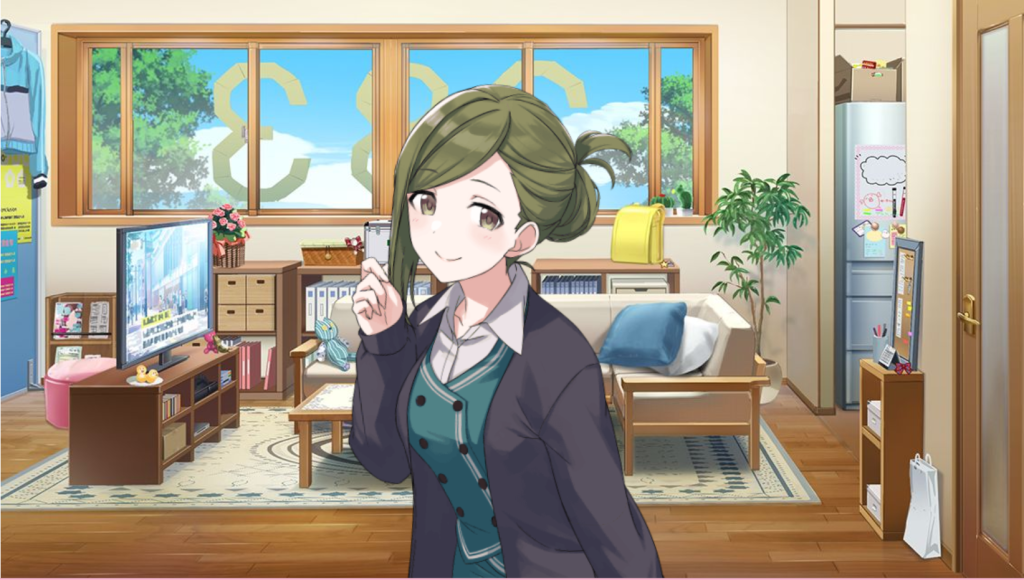
Upon opening the browser game for the first time, we are immediately greeted by 283 Production’s secretary, the reliable and paradoxically laidback Hazuki Nanakusa. The lounge room of the office is dominated by bright colors of white and brown, with carefully chosen furnishings and decor. The room is adorned with a large, inviting window, presenting the beautiful landscape parallel to this building. The natural light that floods through the window enhances the beauty of the surroundings, making it a serene and inspiring space to work in. Alas, a workplace of dreams and ambition!
What instantly set this work apart from my other experiences with the franchise was its realism and personalness. Cinderella Girls characters and events are far more one-dimensional with their playful disposition: “girls just wanna have fun”. Not that it’s a bad thing; it most certainly isn’t. It’s just that Shiny Colors wouldn’t be caught dead with a character whose whole gimmick is that she likes large breasts, that’s all.







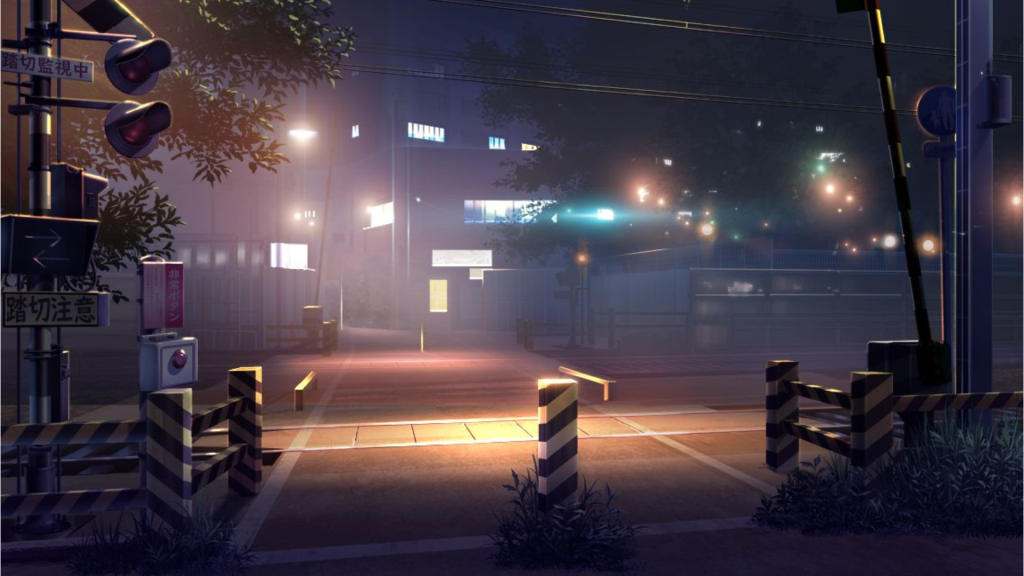

The backgrounds are filled to the brim with realistic depictions of our beloved mundane lives. Many shots incorporate a wide and spacious area, typically filled with the hustle and bustle of these places: the mall, idol events, shopping districts, and school. Everything is coated with a modern veneer; it’s familiar. There are incredible close-ups on seemingly pointless objects; they serve as great tools for conveying emotions or facilitating meaningful reflection and dialogue. They are especially useful when a direct confrontation with their surroundings isn’t important. The most powerful scenes are a mix of both of these, much like my own melancholic observations of the world, it’s the emptiness found in populated places. The empty train car, the quiet night sky over a dimly lit residential street, a movie theater with no seats occupied other than your own. Perhaps it is indicative of the dreamlike world the working man sees—no time for himself and no time for others—a completely irrational and confusing scenario; indifference from the universe that both birthed you yet willingly rejects you at every turn. Or, perchance, I am projecting my worldview onto a media franchise dedicated to selling me a product. As I navigate the corridors of 283 Production’s office, both in the concrete jungle outside my window and the digital realm within Shiny Colors, I find a shared narrative—one that resonates with the rhythm of existence in its most raw and unfiltered form.
Shiny Colors, like the original series, is heavily involved with the “work” side of the idol industry. We aren’t faced with the challenge of full-comboing a Master+ song for gems; we are challenged with producing new faces in the industry. Our failures and achievements hold a lot of weight for these girls, kind of like a VN. If we don’t complete the route, we witness the characters at their most depressed, and if we do, we witness the tears of happiness that we were meant to bring. Through W.I.N.G., we get to see the girls explore life, create new dreams, and express their own personal struggles with our weirdly talkative MC.
Most of the time, the producer is delegated to just being a self-insert; not that you can’t self-insert; it’s just that he’s probably better than you and me, like, a lot better. He adds a far more personal touch than the more typical faceless MCs could ever dream of having. Some fans are a bit against him being an actual character, but he’s absolutely necessary in a lot of stories told in Shiny Colors, namely ANY SHHIS events. But I can see where they’re coming from; it’s usually a game you can easily insert yourself into, and that has its audience. Me. Producer is more of an inspiration than anything else; I simply need to improve in all areas to be worthy of inserting myself as him.
Being a character-driven series, the characters take the main focus. (duh) The cast of Shiny Colors is much more manageable at a meager 28 idols. You can spend a lot more time developing each individual character than you can in something like Cinderella Girls. Each character has plenty of time to show off their qualities and grow; from events or through their SSRs, there is always more to learn about them. The characters grow organically alongside the reader.
The idols come off as genuine, approachable people, so finding “the one” out of all of them was exceptionally difficult for me. More often than not, I look for a character who I can relate to—someone whose struggles mirror my own—someone who I can observe and learn from. Miyu Mifune represented the more pragmatic issues I had in my approach to work, moving on from doing what’s best to doing what you “love”.
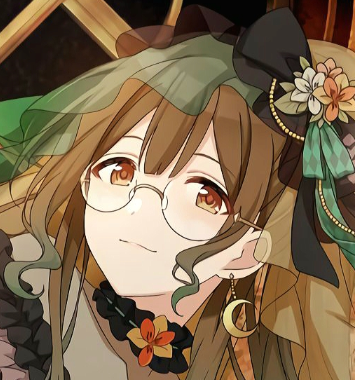
Chiyuki Kuwayama represents the person I thought I was.
make a noise
I’ve used the term “idol” quite frequently—around 14 times thus far—in my extraneous attempts to correlate the mild aversion I have towards my own pragmatic “Riajuu” (リア充) sensibilities to a media franchise replete with fictional female entertainers. It begs the question: What is an idol? I could bore you with academic texts and say sweet words without much meaning, but I’ll spare you the superfluous descriptors. We won’t need them. Idols exist far outside the limits of our respective worlds. The agencies behind those beloved 2.5D angels simply use them as a way to market to you. So what? When one delves too deeply into contemplation, the entirety of existence appears exploitative and irrational. The more questions you ask, the fewer answers you’ll get. What good will it do to question the intent behind the wide smile before you? Idols are just idols. Between you and me, the only question you should be asking now is, “What can ‘Idol’ do for me?”
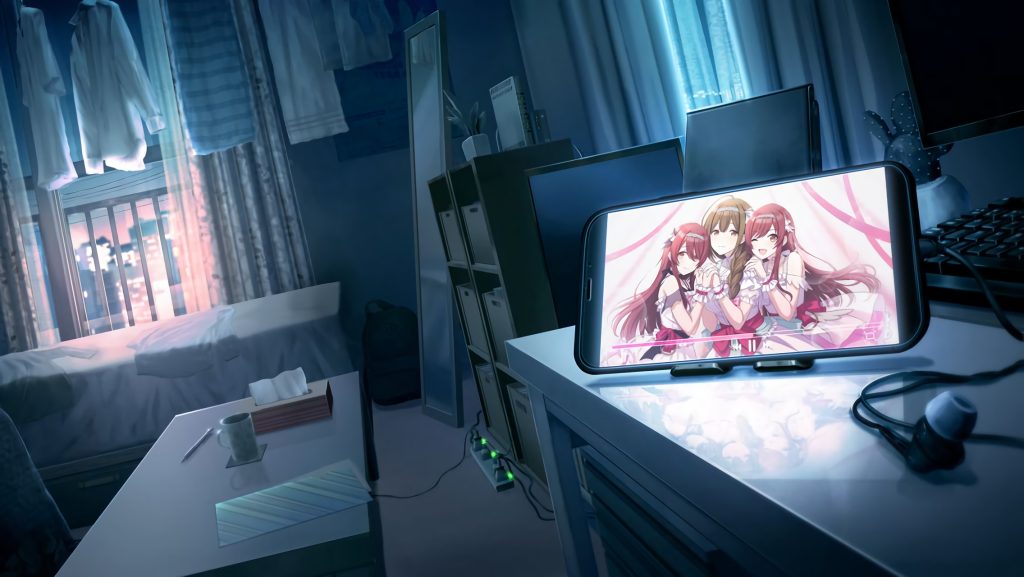
To those who are nameless—YOUR/MY Love Letter. This event has a rather unique structure. It’s practically a given that the idols are the main focus of the storyline, which in this case is at least somewhat true. Alstreomeria (the idol group the event is about) has maybe a handful of lines; instead, the vast majority of the spotlight is shone on the faceless mobs you might catch a glimpse of in backdrop CGs. In a large shift in perspective, the idols merely exist as a small part of the mob’s daily lives. All five of the characters have differing levels of interest in Alstreomeria, but every single one of them has something in common. Through Alstromeria, they begin to understand their own circumstances. Idol has power.
I spent a few days trying to find the best words to express my love for this event. I’ve come to the conclusion that the best way to do that is to let you read it. Here is a link to the event translated into English. It’s just one of many great stories in this series.
More than anything else, the event is about work, though if you really think about it, Shiny Colors is all about “work.” Being an idol is an occupation, after all. With that in mind, questioning “idol” becomes much more self-directed. After all, aren’t we all the same? You, The Idol, and I are all functioning parts of society, operating during a time called “morning.” The idol, you, and I are all just people. Let’s forget the trivial matters and do our best.
Perhaps I have been focused too heavily on the wrong aspects of life, the wrong aspects of Idolmaster. Maybe “idol” wants me to see something far more simple. Let’s go back to our tender years—our years of love.
What originally brought me to where I am now? What are my goals? What do I gain from work? Why am I a numbers-obsessed otaku with an inclination for solitude?
In a weird turn of events, I decided to change my life because of Chiyuki Kuwayama. Half of the reason was because of my infatuation with her; the other half was because I saw myself in her. Chiyuki’s main traits are incredibly selfless. She’s the type of person who does everything in her power to help other people. She’ll give up her dreams to make sure someone else feels that happiness. She’ll even give up “herself” so others can have what she deems to be the “correct” Chiyuki. Her altruism rivals that of Jesus. But she still has a side that conflicts with her selflessness. She wants to keep doing what she loves. She’s greedy; she wants to please everyone, including herself.
I’m nothing like her, and it’s plain to see. She’s everything I wanted to be; she’s someone I should’ve been.
I grew up in a religion that instilled a “false consciousness” in place of my actual consciousness. They valued “morality” and expected the members to hold up to the standards set up by Jesus. We were to be kind, selfless, and humble. These are certainly “moral” traits, and by most religious dogma, objectively positive traits. But I’m nothing like that. It was imitation, nothing more. Chiyuki’s “selfishness” (she’s literally an angel) was far more indicative of who I was than the selfless person she acted as. I am selfish; I care about myself above all else.
Although, it wouldn’t be long before I could cast aside the “moralities” of religion.
Religion is a topic that belongs in an entry of its own, but it’s necessary to pry into the mindset I had. I viewed everything as a transitional period in my life. I wasn’t put on this earth to experience its wonders or anything of the sort. I was put on the planet to serve God and make sure I lived up to Christ’s standards. My future was already set in place for me. I was going to live in a paradise on earth or heaven for my good deeds on this planet. Frankly, my entire existence was transitional.
One of the few aspects I could actually take hold of was choosing my career. College was frowned upon in the religion because they didn’t want the claws of the devil luring me into the “worldly” side. Or… they don’t want me to get educated because I’ll leave their asses. (That’s what happened.) I think I subconsciously knew what I had to do to take hold of my life. I had to grasp at the virtual hands before me. The earliest truth was love, and I wouldn’t forget that. The love from the congregation and my immediate family was not my own. I had to take a leap of faith into the loving arms of Chiyuki Kuwayama.
Things may have changed since then, but the sentiment stays the same. People love you. It’s one of the simplest and earliest things you can learn. It’s no wonder we have constant reminders in every single corner of the world.
Work is always stressful; it’s not something anyone could feel empowered by. Work is a means to an end, but I already knew that. It’s universal; it’s as basic to life as breathing. You need people who make you feel loved. You aren’t just another thing to be replaced. That same man walking through the doors of that huge corporate building is not the same man at home. Sure, nothing has really changed. He’s still just another salaryman for an uncaring business, but he’s also a loving father to his wonderful family. Give yourself some importance. You, your friends, your family, and all of your connections are what give you your humanity. Without looking up from the dimly lit screen inside your cubicle, you’ll never truly know your own worth. If left to your own to wallow in your interests, you begin to lose sight of what really matters.
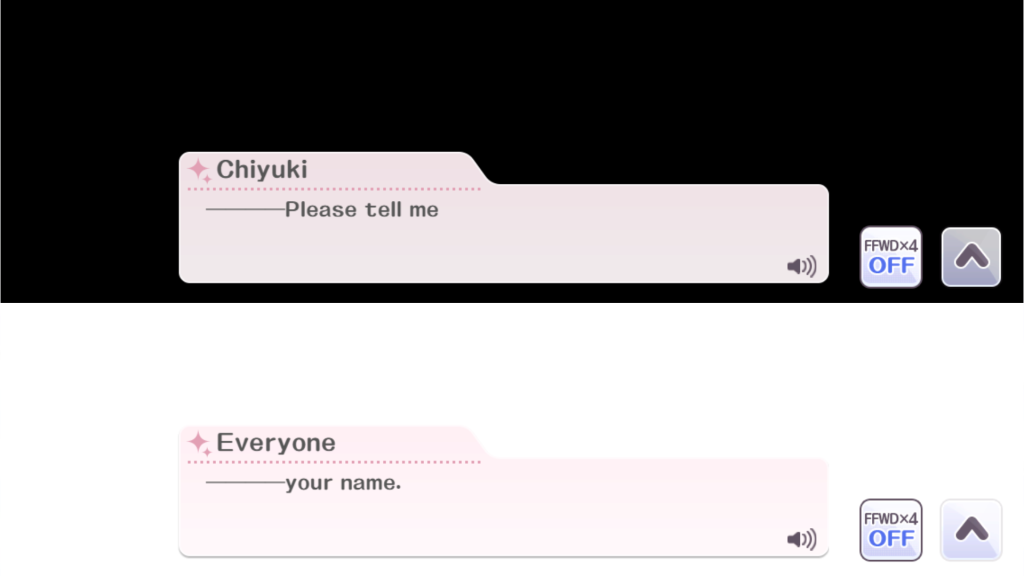
After all this time, I was ignoring the plainest truth.
That is what “idol” has done for me.
The scenery hasn’t changed. My college campus still looks the same. The world is in the same few shades of blue and steel. The corporate buildings still glare with their uncaring gaze. The mundane working life still holds the same enigmatic tones as it did before. The world won’t change; all it does is turn.
Although, if just for a moment, “my” world has changed. I can’t picture myself as a nameless background character. I no longer harbor the shackles of my past. My ZFlip4’s battery has completely diminished. Alas, I can finally become myself.
BGM: ALSTROEMERIA – Anniversary
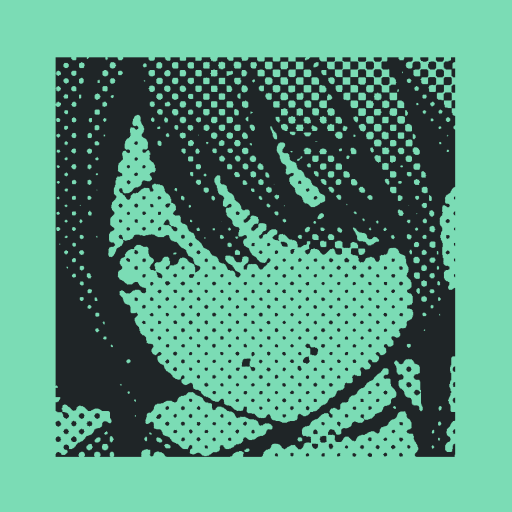

Leave a Reply